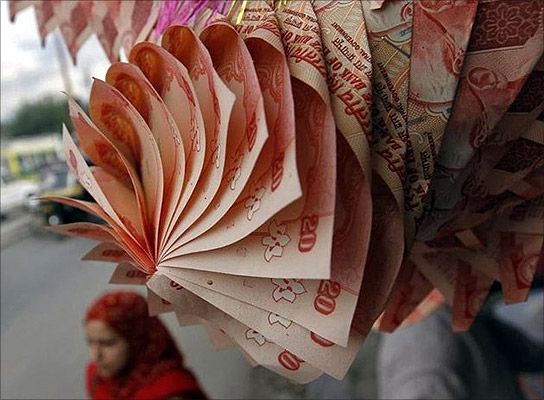 Corporate India's earnings in the past two quarters were largely driven by the rupee's sharp fall versus the dollar in the second quarter of this financial year.
Corporate India's earnings in the past two quarters were largely driven by the rupee's sharp fall versus the dollar in the second quarter of this financial year.
But the recent surge in the Indian currency's value, according to experts, might stall the uptick in corporate earnings in the near to medium term.
The rupee declined 12.5 per cent to 62.07 a dollar in the second quarter, giving a boost to earnings on higher translation gains. The trend continued in the third quarter, too, as the rupee averaged 61.98 a dollar.
But now the Indian currency has appreciated more than one per cent sequentially to 61.09 a dollar. So, analysts say, the impact on earnings might not be significant in the current quarter, but damage will be felt if the rupee continues to appreciate to the 57-58 level in coming months.
"The impact would be felt in the next quarter. Appreciation reduces rupee revenues and profitability for our export business," says Uday Baldota, senior vice-president, finance & accounts at Sun Pharmaceutical. The company has been one of the top performers in the past three years and foreign sales account for nearly 80 per cent of its revenues.
Firms like Sun Pharma have been critical to the earnings trajectory, as export-driven sectors like information technology (IT) and pharma have driven corporate earnings in the past three years, despite a slowdown in the domestic market.
The share of IT exporters, such as Infosys, Wipro, TCS and HCL Technologies, in corporate earnings doubled to 14.5 per cent in the December 2013 quarter from seven per cent in 2010.
The IT and pharma sectors together accounted for a fifth of the net profit (adjusted for exceptional items) for the entire universe of listed firms during the December quarter, up from around 10 per cent in 2010.
The contribution of exports to headline earnings would increase to nearly 33 per cent if export-dependent companies in sectors like automobile, textile, agro-chemicals and hospitality are included.
These sectors now face the worst risk from the rupee's appreciation.
A strong show from export-driven companies had cushioned the blow from poor earnings in domestic demand-driven sectors and was instrumental in holding up the overall corporate earnings in the face of an economic slowdown.
India Inc's combined earnings would have been around 20 per cent lower if the numbers for IT and pharma companies were excluded. Not surprisingly, the market recovery was initially triggered by big dollar earners, such as TCS, Infosys, Sun Pharma, Lupin, Dr Reddy's Lab, Tata Motors and Bajaj Auto. Other exporters are taking a more sanguine view, given that rupee is still down on a year-on-year basis.
"It would still be marginally positive because the realisation for the full year would still be higher and well within our expectations," says Bajaj Auto Managing Director Rajiv Bajaj. The company is India's top two-wheeler exporter, with a large presence in Africa and Latin America.
Jigar Shah of Kim Eng Securities says: "If the currency appreciates to 55-57 a dollar, it will affect India's export competitiveness by hurting dollar earnings." A one per cent change in rupee-dollar rate can impact earnings by two-three per cent of Indian IT companies. While the bigger companies would see a lower impact on earnings in the near term, thanks to their hedges, medium-sized ones that do not hedge incomes would be impacted if the rupee appreciates sharply in May.
 Hardik Shah of KR Choksey says: "The new government could be a Black Swan event for Indian IT companies, considering that most players on the Street are working with rupee-dollar assumptions in a narrow range of 60-63 going forward."
Hardik Shah of KR Choksey says: "The new government could be a Black Swan event for Indian IT companies, considering that most players on the Street are working with rupee-dollar assumptions in a narrow range of 60-63 going forward."
Others, however, discount the current phase of depreciation. "Economic fundamentals don't support the rupee's appreciation. It is being purely driven by capital inflows that could cease anytime and we are fully hedged," says the chief financial officer of a leading cement company that imports coal to fire its plants.
For the current cheer on the Street to sustain, domestic demand-driven companies in sectors like capital goods, construction & infrastructure, banking and oil & gas will need to do the heavy lifting and compensate for the potential earnings loss in export-driven sectors.
This will require a faster economic and demand recovery in the domestic market, besides a continuous flow of dollar from foreign investors to fund India's persistent current account deficit, experts say.












 © 2025
© 2025